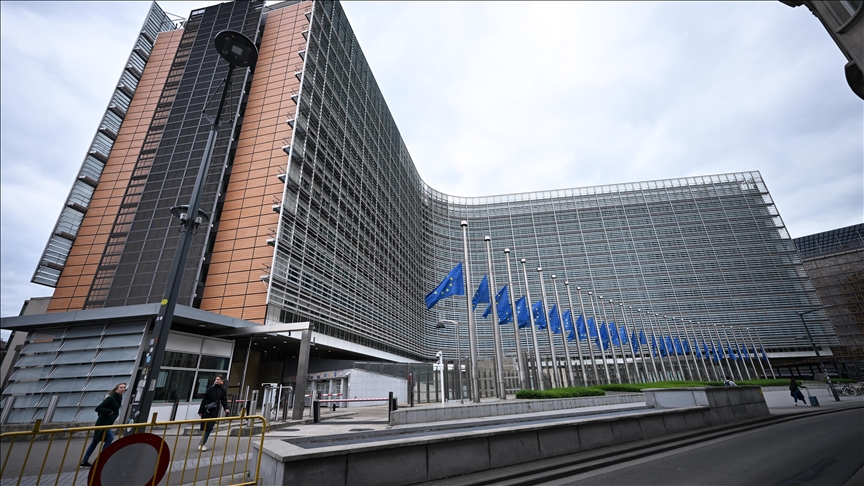EU leaders gather to discuss security, US tariffs and migration amid global tensions
Majority of leaders will arrive at the year's final summit following high-stakes NATO meeting

BRUSSELS
EU leaders gathered in Brussels on Thursday for the final summit of the year to address growing geoeconomic and security challenges, focusing on Europe's strategic competitiveness, defense readiness, and external relations amid ongoing crises in Ukraine and the Middle East.
Leaders gather in Brussels for the final gathering of the regular term and the conclusion of Poland's six-month presidency of the Council.
The summit comes at a time of mounting global uncertainty, with EU heads of state and government seeking to reinforce the bloc's position while preparing for future shocks.
The majority of leaders will arrive following a high-stakes NATO summit, where they pledged substantial increases in defense spending and worked to smooth over tensions with US President Donald Trump.
Security and defense top agenda
Strengthening European security and defense remains high on the agenda, as leaders assess progress on boosting the EU's defense capabilities by 2030. The meeting follows the NATO summit in The Hague, with EU members who are also NATO allies expected to align efforts on readiness and industrial capacity.
"Going forward, we must be guided by a collective approach to defense and security, and a focus on efficient spending," European Council President Antonio Costa said earlier.
Leaders will also review the bloc's ability to counter hybrid threats and reinforce internal security structures in light of growing cyber threats and foreign interference.
Competitiveness and trade resilience
Amid growing concerns about economic fragmentation and global trade tensions, leaders are expected to address Europe's long-term competitiveness and industrial resilience.
Discussions are likely to touch on strengthening the EU's strategic autonomy, bolstering critical supply chains, and maintaining a level playing field in global trade, especially in light of recent geopolitical tensions affecting global markets.
Meanwhile, Trump's threatened tariffs are putting pressure on the EU, which handles trade negotiations for all 27 member states. On Wednesday, he criticized Spain for insufficient defense spending and hinted at additional tariffs. France's president pushed back, accusing Trump of launching a trade war against traditional allies.
The US, under Trump, currently maintains a 10% tariff on most EU goods, on top of higher sector-specific rates (25% on cars and 50% on steel/aluminum), implemented since April 2025.
A looming deadline of July��9 approaches: Trump has threatened to raise reciprocal tariffs to 50% if a deal isn't reached by then, though he recently postponed that increase from June 1 to allow diplomacy more time.
Brussels has offered concessions such as aligning self-driving car regulations and increasing gas/arms purchases to seek relief on steel, cars, semiconductors, and pharma. However, European Commission President von der Leyen has emphasized the EU will not compromise its regulatory autonomy, particularly regarding digital standards and environmental norms.
Middle East and Ukraine
EU leaders are expected to reiterate their unwavering support for Ukraine, with discussions set to include Ukraine’s path toward EU membership and military support. Ukrainian President Volodymyr Zelenskyy is scheduled to join the summit via video conference.
Leaders will explore options to increase pressure on Russia, including calls for a "meaningful ceasefire and genuine negotiations."
Members will be debating an 18th package of sanctions on Russia and the future of the price cap on Russian oil, measures some countries resist over concerns they could drive up energy costs.
The summit will also address the deteriorating humanitarian situation in Gaza and the risk of further regional escalation. EU leaders are expected to underline the need for de-escalation, humanitarian access, and support for a two-state solution.
Irish Prime Minister Micheal Martin told reporters ahead of the summit that he plans to raise the revision of the EU-Israel Association Agreement and sanctions on Israeli settlers in the occupied West Bank, topics that are also expected to be part of the discussions.
Migration and border security
Migration remains a key issue, with leaders set to follow up on implementation of previous agreements and assess progress on securing external borders. The European Commission is expected to provide input on operational measures and long-term migration management.
In response to recent crises and emerging threats, leaders will also discuss strengthening the EU's overall preparedness, including civil protection, crisis management, and resilience against hybrid activities.
The summit will end with a statement of conclusions that will shape the EU’s agenda for the next four months and serve as a barometer of Europe’s political mood on key regional and global challenges.
Anadolu Agency website contains only a portion of the news stories offered to subscribers in the AA News Broadcasting System (HAS), and in summarized form. Please contact us for subscription options.







